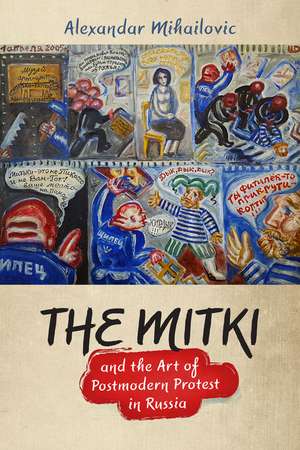The Mitki and the Art of Postmodern Protest in Russia
Autor Alexandar Mihailovicen Limba Engleză Paperback – 19 noi 2019
| Toate formatele și edițiile | Preț | Express |
|---|---|---|
| Paperback (1) | 177.53 lei 6-8 săpt. | |
| University of Wisconsin Press – 19 noi 2019 | 177.53 lei 6-8 săpt. | |
| Hardback (1) | 585.29 lei 6-8 săpt. | |
| University of Wisconsin Press – 27 feb 2018 | 585.29 lei 6-8 săpt. |
Preț: 177.53 lei
Nou
Puncte Express: 266
Preț estimativ în valută:
33.97€ • 36.89$ • 28.54£
33.97€ • 36.89$ • 28.54£
Carte tipărită la comandă
Livrare economică 22 aprilie-06 mai
Preluare comenzi: 021 569.72.76
Specificații
ISBN-13: 9780299314941
ISBN-10: 0299314944
Pagini: 272
Ilustrații: 35 b-w illus.
Dimensiuni: 152 x 229 x 18 mm
Greutate: 0.37 kg
Ediția:1
Editura: University of Wisconsin Press
Colecția University of Wisconsin Press
ISBN-10: 0299314944
Pagini: 272
Ilustrații: 35 b-w illus.
Dimensiuni: 152 x 229 x 18 mm
Greutate: 0.37 kg
Ediția:1
Editura: University of Wisconsin Press
Colecția University of Wisconsin Press
Recenzii
"A masterful exploration of the work and world of the Mitki that moves seamlessly between analysis of different art forms—graphic arts, literature, and film—and chronicles the journey of its original members from debauched alcoholism to sobriety."—Emily Johnson, author of How St. Petersburg Learned to Study Itself
"Russian nonconformist art rises and falls. But the Mitki story, with its goofy heroes, gorgeous colors, and weird affirmation of foolishness and failure as the safest path to freedom, introduces us to the theatricalized postmodern in a form that can never be co-opted by a politics. A mind-bending book."—Caryl Emerson, Princeton University
"Mihailovic makes a convincing case for the group's creative disengagement from Soviet discourse and society constituting its most powerful contribution to political protest in Russia."—Slavic Review
"Russian nonconformist art rises and falls. But the Mitki story, with its goofy heroes, gorgeous colors, and weird affirmation of foolishness and failure as the safest path to freedom, introduces us to the theatricalized postmodern in a form that can never be co-opted by a politics. A mind-bending book."—Caryl Emerson, Princeton University
"Mihailovic makes a convincing case for the group's creative disengagement from Soviet discourse and society constituting its most powerful contribution to political protest in Russia."—Slavic Review
Notă biografică
Alexandar Mihailovic is a professor emeritus of comparative literature and Russian at Hofstra University and a visiting professor of literature at Bennington College.
Descriere
During the late Soviet period, the art collective known as the Mitki emerged in Leningrad. Alexandar Mihailovic draws on extensive interviews with members of the collective and illuminates their critique of the authoritarian state, militarism, and social strictures from the Brezhnev years to the present.
Cuprins
Acknowledgments
List of Illustrations
Introduction: Post Modern: The Mitki’s Chronicle of Russian Leadership
1 Glimmer Twins of the Leningrad Underground: The Creation of Dmitri Shagin in Vladimir Shinkarev’s Mitk
2 “Who is This Heroic Man?”: David Bowie and the Mitki’s Queering of Masculinity
3 Fire Water: Alcohol and Rehabilitation in the St. Petersburg of the Mitki
4 Mosaic Authorship: A Co-Production of Olga & Aleksandr Florensky
5 Satire, Sex and Chance: The Creative Diary of Viktor Tikhomirov
Conclusion: Icarus Rising: The Mitki Against the Russia of The Twenty-First Century
Appendix: Vladimir Shinkarev, “In Praise of the Boiler Room”
Notes
Bibliography
Index
List of Illustrations
Introduction: Post Modern: The Mitki’s Chronicle of Russian Leadership
1 Glimmer Twins of the Leningrad Underground: The Creation of Dmitri Shagin in Vladimir Shinkarev’s Mitk
2 “Who is This Heroic Man?”: David Bowie and the Mitki’s Queering of Masculinity
3 Fire Water: Alcohol and Rehabilitation in the St. Petersburg of the Mitki
4 Mosaic Authorship: A Co-Production of Olga & Aleksandr Florensky
5 Satire, Sex and Chance: The Creative Diary of Viktor Tikhomirov
Conclusion: Icarus Rising: The Mitki Against the Russia of The Twenty-First Century
Appendix: Vladimir Shinkarev, “In Praise of the Boiler Room”
Notes
Bibliography
Index
